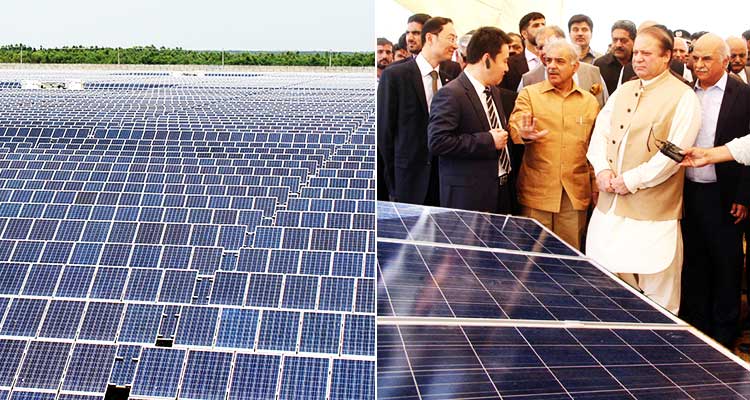Written by: Dr. Dushka H. Saiyid
Posted on: January 28, 2017 |  | 中文
| 中文
In a conversation: (R-L) Chinese Ambassador H.E Sun Weidong, Senator Mushahid Hussain Sayed, Dr. Dushka H Saiyid
H.E. Sun Weidong, Ambassador of Peoples Republic of China to Pakistan, gave a special interview to Youlin magazine on the eve of the Chinese New Year, the year of the Rooster in 2017. The centerpiece of the China-Pakistan relations is the CPEC or the China-Pakistan Economic Corridor, which has added depth, and strengthened the already existing economic and strategic relationship between the two countries. CPEC is a major pilot project of One Belt One Road (OBOR), the development strategy of President Xi Jinping, based on connectivity and cooperation between China and countries of Eurasia. It was under Ambassador Sun Weidong’s watch that President Xi Jinping paid a state visit to Pakistan in 2015, and work began on CPEC.
H.E. Sun Weidong explained the concept of Rooster in the Chinese calendar, saying it is a symbol of time to rise and get to work, and drew parallels with the CPEC which has entered a stage of full implementation in 2017. With its focus on infrastructure and energy generation, he drew attention to seventeen early harvest projects that have been inaugurated. In energy field both the Bahawalpur 100MW Solar Power Plant and the Dawood Wind Power Plant have been completed, while the Sachal Wind Power Plant is almost there; the Karot Hydropower Station, Port Qasim Coal Power Plant, Sahiwal Coal Power Plant and five other power projects are under construction. He pointed out that the completion of these power projects would go a long way in solving the chronic shortage of electricity and gas that has been hobbling Pakistan’s industry.

He also mentioned the work being done in the transportation field: Karakoram Highway Phase II (Thakot to Raikot section), and Karachi to Lahore Motorway (Multan to Sukkur Section), were successfully launched and are under construction; the joint feasibility study of the up gradation of Pakistan Main Line 1 (ML1) Railway has been completed. Both sides are consulting on the financing of ML1 and have signed the Letter of Exchange on Gwadar East-bay Expressway, while the Chinese side is accelerating its procedure for the approval of construction of Gwadar New International Airport.
The Ambassador dealt at some length on the 6th Joint Committee Cooperation meeting in Beijing held at the end of December 2016, which besides taking stock of the progress made on various projects and plans for new ones, focused on the development of human resources, and promotion of cultural activities. He pointed out that there are already more than 3500 Pakistani students studying in China on Chinese government scholarship, forming the largest foreign contingent, while the Gwadar China-Pakistan Friendship Primary School made with Chinese aid, was completed in late August. The existing five Confucius Institutes in Pakistan are playing a key role in promoting the study of Chinese language and conducting bilateral cultural exchanges. At the JCC meeting it was decided to further strengthen cooperation in the fields of education with vocational and technical training, medical care, fishery, and promote deeper people-to-people understanding through cultural exchanges, and cooperation between think tanks, universities and media. The Chinese side proposed sending expert teams to Pakistan to conduct training workshops in industrial zones, for rural development, water resource management and treatment, and disaster management. They also decided that the China Foundation for Peace and Development will build a training center for senior talents in Quetta, and will also push for a leading university to cooperate with the University of Gwadar in oceanography.
CPEC has helped harness Pakistan’s economy to the Chinese, which has a share of 30% in the global economy, and grew at the rate of 6.7% in 2016, as was planned. Explaining the impact of CPEC on the Pakistani economy, he said that it had already created 14,000 jobs and generated substantial revenues, and these figures would only improve as the CPEC projects are implemented. China has been the largest investor and trading partner of Pakistan for the last two consecutive years, and the second largest export destination for Pakistan, while the bilateral trade of the two countries rose to $17.2 billion in the first eleven months of 2016. The Ambassador explained the changes taking place in the Chinese economy, which having lifted 70 million people out of poverty, and is now making a paradigm shift in its structure: substituting its driving force from labour to innovation, from quantity to quality, and moving towards science, technology and IT. Since China has become a signatory to the Paris Agreement on Climate Change, it is abandoning high polluting industries.
The Ambassador also discussed the role of President Xi Jinping at Davos, where he provided an alternative vision of free trade, cooperation and inclusiveness. Ambassador Sun Weidong was quick to point out that China was not just a beneficiary of free trade, but contributed 30% of GDP to the growth of global economy. Klaus Schwab, the moving spirit behind the World Economic Forum, endorsed the Chinese leader’s vision and policy when he declared that the Chinese leader’s dream is the global dream.
The Ambassador expressed the hope that the media in Pakistan would create a favourable climate for the promotion of China-Pakistan relations, giving due coverage to the remarkable achievements and progress in their bilateral relations. The Ambassador appreciated the services of Senator Mushahid Hussain for actively promoting China-Pakistan friendship, and praised the Youlin magazine for promoting the cultures of the two countries and acting as a communication bridge between the two peoples.
You may also like: